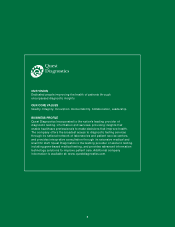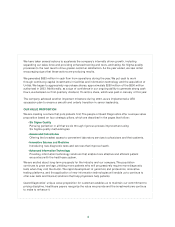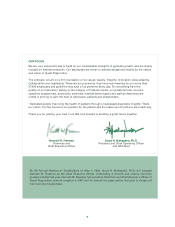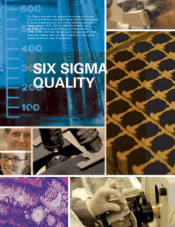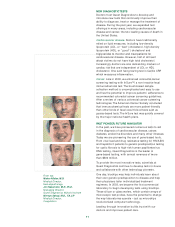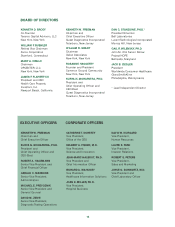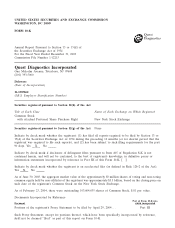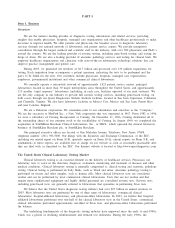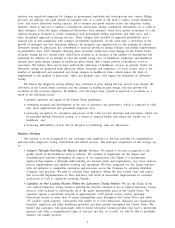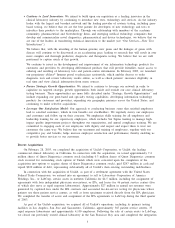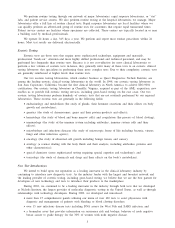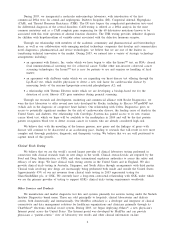Quest Diagnostics 2003 Annual Report Download - page 13
Download and view the complete annual report
Please find page 13 of the 2003 Quest Diagnostics annual report below. You can navigate through the pages in the report by either clicking on the pages listed below, or by using the keyword search tool below to find specific information within the annual report.
11
NEW DIAGNOSTIC TESTS
Doctors trust Quest Diagnostics to develop and
introduce new tests that continually improve their
ability to diagnose, treat or manage the treatment of
disease. During the past year, we expanded test
offerings in many areas, including cardiovascular
disease and cancer, the two leading causes of death in
the United States.
Cardiovascular disease. Doctors have traditionally
relied on lipid measures, including low-density
lipoprotein (LDL, or “ bad” ) cholesterol, high-density
lipoprotein (HDL, or “ good” ) cholesterol and
triglycerides to monitor and treat patients for
cardiovascular disease. However, half of all heart
attack victims do not have high total cholesterol.
Increasingly doctors are also demanding markers of
cardiac risk that are independent of LDL or HDL
cholesterol. One such fast-growing test is Cardio CRP,
which measures inflammation.
Cancer. Late in 2003, we enhanced colorectal cancer
screening testing with InSure™, a non-invasive fecal
immunochemical test. The brush-based sample
collection method is uncomplicated and easy to use
and has the potential to improve patients’ adherence to
recommended colorectal cancer screening guidelines.
After a review of various colorectal cancer screening
technologies, The American Cancer Society concluded
that immunochemical tests are more patient-friendly
than other kinds of fecal occult blood tests such as
guaiac-based tests. The InSure test was quickly covered
by the major national health plans.
PAST PIONEER, FUTURE NAVIGATOR
In the past, we have pioneered numerous tests to aid
in the diagnosis of cardiovascular disease, cancer,
diabetes, endocrine disorders and many other illnesses.
Today we are pioneering the use of gene-based tools.
From viral load and drug resistance testing for HIV/AIDS
and hepatitis C patients to genetic predisposition testing
for cystic fibrosis to high-risk human papillomavirus
DNA testing, Quest Diagnostics is the leader in
gene-based testing, with annual revenues of more
than $500 million.
To provide the most innovative tests, scientists at
Quest Diagnostics continue to develop tests in-house
and collaborate with other technology pioneers.
One day, biochips may help individuals learn about
their own genetic predisposition to disease and help
their physicians tailor individualized treatment
regimens. In 2003, we became the first commercial
laboratory to begin developing tests using biochips.
These silicon or glass wafers, which contain arrays of
microscopic test probes, have the potential to change
the way laboratories operate – just as microchips
revolutionized computer technology.
Leading through innovation builds trust with our
doctors and improves patient care.
From top:
Maher Albitar, M.D.
Medical Director,
Hematopathology
Jon Nakamoto, M.D., Ph.D.
Managing Director,
Quest Diagnostics Nichols Institute
Mervyn Sahud, M.D., F.A.C.P
Medical Director,
Coagulation



